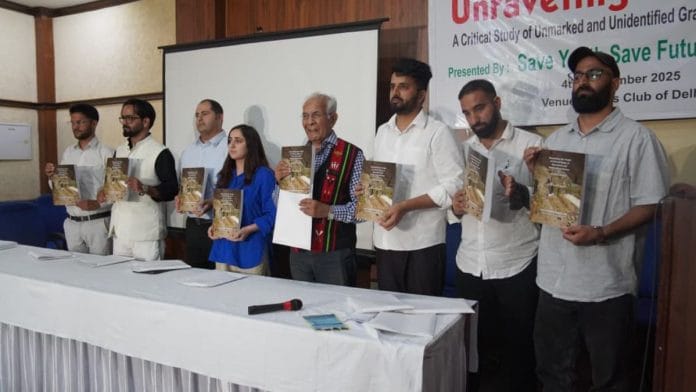New Delhi: More than 60 percent of the unmarked and unidentified graves in terrorism-affected districts of Kashmir are of foreign terrorists, a local NGO called Save Youth, Save Future has claimed in a report after conducting a ‘field investigation’.
The report also said that only nine graves in the four districts surveyed were of civilians, accounting for a mere 0.2 percent of the total graves—contradicting claims of widespread extrajudicial killings and mass civilian graves.
The NGO said it had carried out studies across 373 graveyards in four districts—Baramulla, Kupwara, Bandipora, and Ganderbal. Of a total 4,056 previously unidentified graves, 2,493 were found to be of foreign terrorists, it said in its report.
Moreover, 1,208 graves belonged to local terrorists, accounting for nearly 30 percent of the previously unidentified graves, according to the NGO. It also said that it could not identify the remaining graves.
The report, titled ‘Unravelling the Truth: A Critical Study of Unmarked and Unidentified Graves in Kashmir Valley’, was released by the organisation’s chairman, Wajahat Farooq Bhat, in Delhi Thursday.
“The issue of unidentified graves has shaped political debates and international narratives for decades, and hence our studies focused purely on facts obtained during field studies, interviews and cross-examination of testimonies through several channels,” Bhat said at a press conference.
He added that his organisation started work in 2018 with a deaddiction campaign in the Valley, before it was roped in for a campaign on deradicalisation by the European Union.
Former Chief Information Commissioner of India, Wajahat Habibullah, who was present at the release of the report, said the NGO had established that there is no such thing as mass graves in Kashmir, unlike Serbia. However, he said, only experts could validate the calibre of the NGO’s investigation.
“Experts would say whether the investigation has been of a high standard. I disagree with some of their conclusions, but it has helped bring closure to an issue,” he said.
Also read: US tags BLA as foreign terrorist group days after Pakistan army chief Munir’s visit. What it means
‘Unravelling the truth’
The scope of the field studies was to identify and classify graves between 1990 and 2023. This timeframe, the NGO said, was marked by significant security developments in the region.
The NGO documented that the phenomenon of unmarked graves essentially became a direct consequence of a decade-long peak of conflict, escalated by cross-border terrorism, supported by Pakistan’s security establishment.
“During this time, the Indian security forces often engaged in frequent counter-militancy operations against both foreign and local terrorists. Many of the casualties, especially those among foreign militants, lacked official identification documents, either due to operational secrecy, destruction of personal effects during armed engagements, or deliberate concealment of identities to protect networks, as the Pakistan government has always denied the involvement of its citizens in Kashmir’s militancy,” read the nearly 500-page-long report.
“As a result, verifying the identity of the deceased, particularly foreign militants, became logistically complex, leading authorities to conduct burials in unidentified graves without formal identification procedures,” it further said.
The report added that due to the chaos and instability caused by prolonged operations and poor documentation protocols, even some local civilians may well have been buried in unmarked graves.
Bhat further said that studies were conducted between 2018 and December 2024 through comprehensive methodologies that included physical inspection of each of the 373 graveyards, followed by documentation in the form of photographs and recording of GPS coordinates.
For better evaluation of these graves, they were divided into five broad categories by the field study groups of the NGO—identified local militants, where full names and family ties were documented; unidentified foreign militants, which were classified based on aliases and accounts of former local terrorists and official records; unmarked graves with no verification; unidentified civilians; graves of tribal invaders killed in 1947.
The process of classification was also based on interviews with a broad cross-section of the community, such as local clerics and members of Auqaf (mosque) committees, gravediggers, families of local terrorists, as well as relatives of missing people, and long-surviving locals who had knowledge of the burials in their local graveyards.
To verify and authenticate these accounts, their testimonies were double-checked with official records, the organisation claimed in its report.
Quantifying the overall number, the NGO claimed that a total of 1,208 graves belonged to local terrorists from Kashmir who had joined various outfits before being killed in encounters with security forces.
These graves also became part of the discussion on unidentified graves after security forces stopped sharing bodies of local militants with their families in order to avoid mass processions that could potentially lead to more radicalisation, sources in the security establishment told ThePrint.
However, these graves were in complete contrast to the ones of foreign terrorists since they were identified correctly and claimed by their respective families.
The NGO recommended that Pakistan acknowledge the burial sites of its citizens and facilitate visits by their family members as per international norms. It also urged Indian authorities to carry out a comprehensive forensic analysis of the 276 unmarked graves in Baramulla district using modern DNA testing techniques to address humanitarian concerns.
The NGO acknowledged the limitations of its study, stating that it was limited to only four districts, adding that more studies are required to cover all districts in the Kashmir region.
(Edited by Viny Mishra)
Also read: Five choices for Modi to restore India’s red line in Kashmir. Each is perilous






